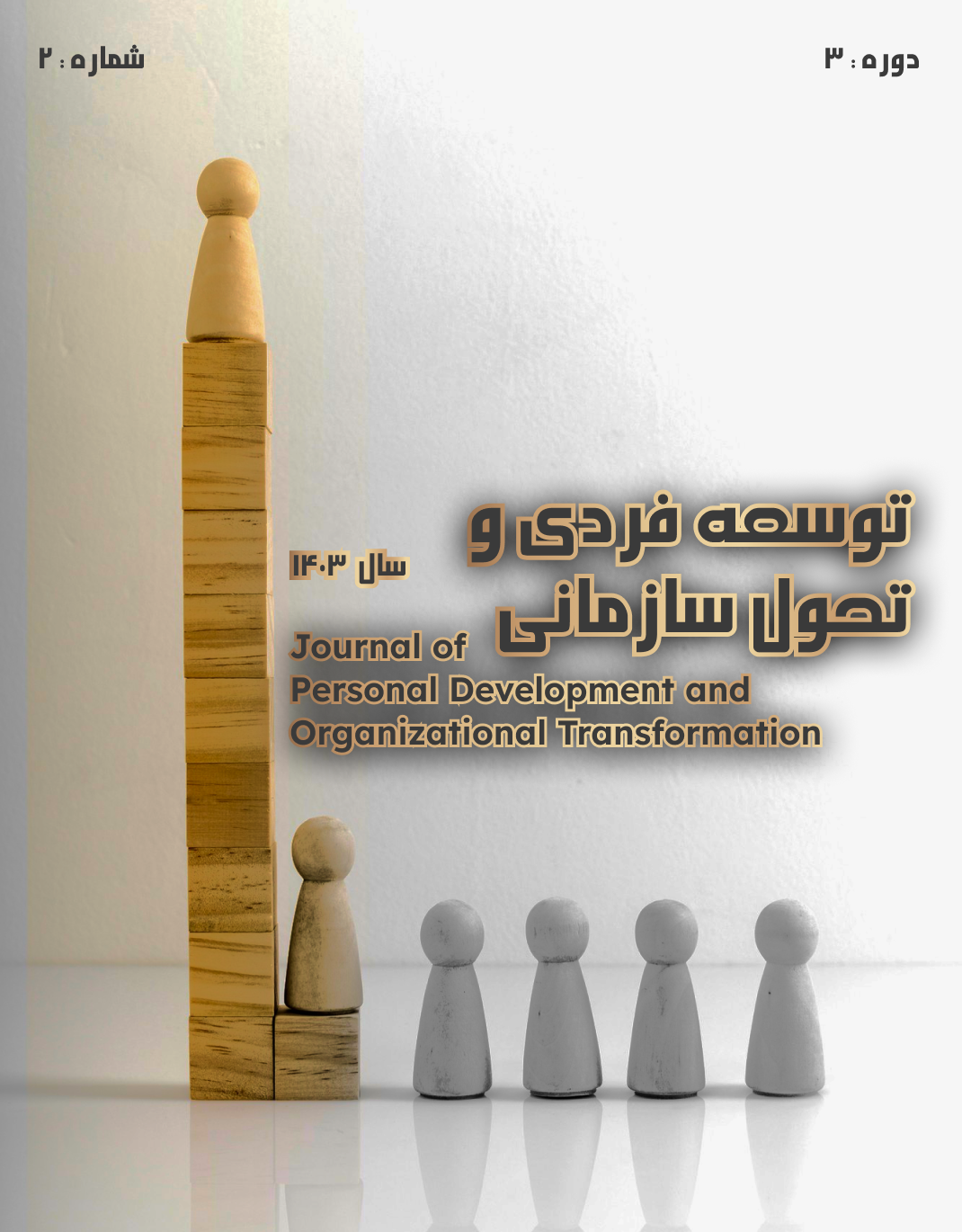تبیین مدل علی پیشبینی اشتیاق شغلی بر اساس سلامت معنوی و سرمایه معنوی معلمان تربیت اسلامی استان صلاحالدین عراق
کلمات کلیدی:
اشتیاق شغلی, سلامت معنوی, سرمایه معنویچکیده
هدف از این پژوهش بررسی نقش پیشبینیکنندگی سلامت معنوی و سرمایه معنوی در اشتیاق شغلی معلمان تربیت اسلامی در استان صلاحالدین عراق بود. پژوهش حاضر به لحاظ هدف کاربردی و از نظر روش، توصیفی-همبستگی بود. جامعه آماری شامل 1115 نفر از معلمان تربیت اسلامی دوره متوسطه دوم در استان صلاحالدین عراق در سال تحصیلی 2024–2025 بود. 391 نفر با روش نمونهگیری در دسترس انتخاب شدند. ابزار جمعآوری دادهها شامل پرسشنامه اشتیاق شغلی اتریخت (2003)، سلامت معنوی دلمن و فری (2004)، و سرمایه معنوی خالیک و همکاران (2014) بود. دادهها با استفاده از آزمونهای آماری چون ضریب همبستگی پیرسون، تحلیل رگرسیون، آزمون تی و مدلیابی معادلات ساختاری با نرمافزار SPSS و SmartPLS تحلیل شدند. نتایج نشان داد بین سلامت معنوی و اشتیاق شغلی (β = 0.326, t = 7.903, p < 0.001) و بین سرمایه معنوی و اشتیاق شغلی (β = 0.237, t = 2.701, p < 0.001) رابطه معناداری وجود دارد. مدل پژوهش دارای برازش قوی با شاخص GOF برابر با 0.709 بود. همچنین مقدار R² برای متغیر اشتیاق شغلی برابر با 0.747 گزارش شد که حاکی از قدرت پیشبینی بالای مدل است. سلامت معنوی و سرمایه معنوی نقش مؤثری در پیشبینی اشتیاق شغلی معلمان ایفا میکنند. نتایج این پژوهش میتواند مبنایی برای برنامهریزی راهبردی در جهت ارتقای انگیزش معلمان و بهبود محیط آموزشی در استان صلاحالدین عراق باشد.
دانلودها
مراجع
Abroshan, S. A.-I. (2019). A mediating role of religious orientation in the relationship between the need for cognition and resilience. Psychology and Religion, 47(12), 101-119. http://ensani.ir/fa/article/416470/
Amiri, M., Nargesian, A., Farahi, A., & Gholami, B. (2021). Presenting a model of spiritual capital in non-governmental organizations in Tehran. Journal of Human Resource Management Research(43), 101-129. https://hrmj.ihu.ac.ir/m/article_206080.html
Anitha, J. (2014). Determinants of employee engagement and their impact on employee performance. International Journal of Productivity and Performance Management, 63(3), 308-323. https://doi.org/10.1108/IJPPM-01-2013-0008
Aryanpour, S., & Khalili Bagheri, H. (2024). The impact of spirituality on the job enthusiasm of physical education teachers with the mediating role of job virtue. Human Resource Management in Sports, 11(1), 191-207. https://shm.shahroodut.ac.ir/article_3070.html
Asghari, A. (2023). Examining the relationship between religiosity, mental health, and job satisfaction of primary school teachers in Naqdeh County. Journal of Psychological and Educational Studies, 9(1), 117-128. https://doi.org/10.1017/S0003055423000175
Binu Raj, A., Ambreesh, P., Tripathi, N. N., & Ambreesh Kumar, A. (2023). Workplace spirituality and job satisfaction among teachers: influence of well-being and spiritual leadership. International Journal of Educational Management, 37(6/7), 1303-1322. https://doi.org/10.1108/IJEM-03-2023-0110
Faqihi Farahmand, N., & Zanjani, S. (2015). Examining the relationship between employees' perceptions of work ethic dimensions with job satisfaction and work stress (case study of the Technical and Vocational Training Organization of Tabriz). Sociological studies, 5(18), 103-118. https://journals.iau.ir/article_521133.html
Fattahi, I., & Amini, A. (2015). Analyzing the concept and types of definitions of spiritual health. Journal of Spiritual Studies(15-16), 5-16. https://www.noormags.ir/view/fa/articlepage/1376625/
Gholipour Khanemiri, T., Khodaei, A., Shirazi, M., & Nazari, K. (2018). Examining the relationship between spiritual health and job satisfaction among nurses in the Shahid Tabatabai Educational Treatment Center. Ethics and History of Medicine, 11, 221-230. https://ijme.tums.ac.ir/browse.php?a_id=6004&sid=1&slc_lang=fa
Golparvar, M., Mosahabi, M. R., Abedini, H., Adibi, Z., & Abdali, F. (2015). Constructing and validating a scale for spiritual capital and spiritual well-being of the elderly. Journal of Educational Measurement(19), 125-145. https://jem.atu.ac.ir/article_1701.html
Hajloo, N., Sobhi Gharamaleki, N., & Aqil Hoshand, R. (2015). Personality predictors of job enthusiasm among teachers. A New Approach in Educational Management, 6(2), 61-75. https://ensani.ir/fa/article/352997/
Haqparast Lati, T., Nadri, A., & Naraghi Sif, M. (2018). A model for a spiritual curriculum in the course of social studies aimed at the development of spiritual health for learners. Journal of Educational Guidance in Medical Sciences(11), 150-157. https://edcbmj.ir/article-1-1539-fa.html
Javaheri, N., & Faraji, H. (2021). Examining the impact of organizational commitment on administrative health with an emphasis on the mediating role of job enthusiasm in the Governorate of North Khorasan. Journal of Administrative Studies and Research(12), 36-50. https://www.noormags.ir/view/fa/articlepage/1879883/
Khalili, A., Asl, M. K., & Farajzadeh, Z. (2014). Spiritual capital and job satisfaction: A case study of university staff. Journal of Management Development, 33(8), 797-809.
Mokhtari, L., Gharaman Zadeh, R., Nasrollah Zadeh, L., & Khorami Markani, A. (2021). The impact of spirituality-based educational intervention on spiritual health and spiritual development of nursing students. Journal of Midwifery, Nursing, and Paramedicine, 7(2). https://sjnmp.muk.ac.ir/browse.php?a_id=421&sid=1&slc_lang=fa
Mousavi Nia, M. J., Ashaqi, M., & Naami, A. Z. (2022). The relationship between ethical leadership, organizational identity, and spirituality in the workplace with unethical behavior for the benefit of the organization, mediating job satisfaction among employees of Shahid Chamran University of Ahvaz. Journal of Knowledge and Research in Applied Psychology(88), 215-225. https://www.sid.ir/paper/1032764/fa
Naami, A. M. (2018). The impact of spirituality training on organizational commitment, retention of human resources, and job enthusiasm of primary school managers. Journal of School administration, 6(1), 153-168. https://ensani.ir/fa/article/453141/
Rezaeirad, M., Payan, S., & Elahi, M. (2022). The relationship between spiritual intelligence and spiritual health with the enhancement of job performance of employees at the University of Medical Sciences of Langeroud. Scientific Research Journal of Quran and Medicine, 7(3), 82-87. https://www.sid.ir/paper/1116680/fa
Rohma, S., Harapan, H., & Wardiah, D. (2020). The Influence of School-Based Management and Teacher's Professionalism toward Teacher's Performance. Journal of Social Work and Science Education, 1(1), 2723-6919. https://doi.org/10.52690/jswse.v1i1.6
Safian, M., Hassanpour, M., Bahmani, A., & Mousavi Davoodi, S. M. (2021). The relationship between spiritual health and organizational health in the staff of the Medical University of Qom. Research in Religion and Health, 7(4), 10-18. https://journals.sbmu.ac.ir/jrrh/article/view/30517
Zhang, E., & Ye, Y. (2024). Understanding how to ignite teacher enthusiasm: The role of school climate, teacher efficacy, and teacher leadership. Current Psychology, 43(15), 13241-13254. https://doi.org/10.1007/s12144-023-05387-2
دانلود
چاپ شده
ارسال
بازنگری
پذیرش
شماره
نوع مقاله
مجوز
حق نشر 2025 فاروق خلف عبید (نویسنده); فرانک امیدیان; قیس ذیاب عبد, مریم براتعلی (نویسنده)

این پروژه تحت مجوز بین المللی Creative Commons Attribution-NonCommercial 4.0 می باشد.







